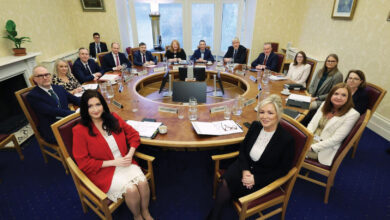Delivering at pace

Chair of the Northern Ireland Assembly’s Agriculture, Environment and Rural Affairs Committee, Declan McAleer MLA talks to David Whelan about the implications of Brexit for the work of the committee and its priorities for the remainder of the mandate.
McAleer does not need to think twice when asked where the bulk of the committee’s energy has been spent following the resumption of the Northern Ireland Assembly in January 2020. “Brexit has completely dominated the skyline of our committee,” states the Chair, explaining: “For over 40 years now, within the island of Ireland, agriculture and rural affairs has been driven by the EU’s Common Agricultural Policy (CAP). For us to be taken out of the EU, against the wishes of the majority of people in the North, has left a huge legislative and policy gap and has created significant challenges.”
The Chair points to the three large pieces of legislation which have dominated the committee’s workload, namely: the UK’s Agriculture Bill; the Environment Bill; and the Fisheries Bill.
“We have gathered evidence and scrutinised those pieces of legislation and raised major concerns. Concerns about how they would interfere with the Protocol and also the potential impact of divergence by Britain, given that we remain part of the EU’s single market.
“These have presented us with huge challenges and have occupied a lot of our bandwidth. Additionally, we’ve been doing a lot of this work remotely because of the pandemic.”
McAleer outlines that as well as scrutiny of the UK bills, the committee has dealt with a hefty volume of secondary legislation, in the form of statutory rules and instruments. He estimates over 50 pieces of legislation in this form have been dealt with by the committee since September 2020, which he explains had to be passed by the end of the transition period (31 December 2020) to enable the Department to have a functioning rulebook. The committee is also actively scrutinising seven common frameworks covering the creation of new policies such as fisheries management, animal welfare, water, and the emissions trading scheme (ETS).
“As a consequence of the legal separation of the UK from the EU, we’re making sure that we have the secondary legislation in place so that we in the North can continue to align with the EU regulations across the vast majority of areas, in line with the Protocol,” he states.
McAleer is Sinn Féin’s agriculture, environment and rural affairs spokesperson and was a member of the previously named Committee for Agriculture and Rural Development between 2012 to 2016. Asked to consider whether the volume of the Brexit workload being undertaken by the committee is partly as a result of the committee’s absence for over three years, when the Assembly wasn’t functioning, he points to the fact that the command paper was only issued in May 2020.
McAleer points to May as effectively when “the clock started ticking” in terms of preparation.
“The Department was working at pace to try and prepare for a set of circumstances, even though it wasn’t sure what the final outcome would be in terms of the UK-EU arrangement. If Stormont had have been operational over those number of years, I’m not sure it would have made any impact because everything happened at pace effectively at the last minute.”
Budget
As Chair, McAleer has been vocal in his concerns around the budget availability to the Department. Pointing to the commitment given by the UK Government to keep the Department of Agriculture, Environment and Rural Affairs (DAERA) Budget at a ceiling of £330 million until the end of the current mandate in Westminster, McAleer believes that the absence of index-linking means that the recent budget represents a £3.3 million cut in real terms.
He has also raised concerns about the short-term nature of the current financial guarantees. “The CAP has a multi-year annual budget over seven years and we’re out of that. The South has got a €10.5 billion share of the CAP budget for the next seven years. On top of that, it has €1.05 billion from the EU’s Brexit adjustment fund. The South can now take that funding, along with its own national investment, and start mapping out and planning for the next seven years. In comparison, we are vastly underfunded.
“I am genuinely very fearful about the ability of our agri-food businesses and our farmers to actually compete with their counterparts in the South because the playing field is so imbalanced due to the EU exit. It is shocking.”
Asked about the influence of the committee in events as demanding as Brexit and the Covid-19 pandemic, McAleer describes the role as vital in ensuring that local interests are represented.
To illustrate this, he highlights the role of the committee in the early days of the pandemic in successfully lobbying the supermarkets over concerns raised that panic buying had led to importation of products, overlooking local produce. Additionally, he points to “heavy lobbying” of the Minister on the need for and shape of support schemes for farmers and the horticultural industry.
“As a consequence of the legal separation of the UK from the EU, we’re making sure that we have the secondary legislation in place so that we in the North can continue to align with the EU regulations across the vast majority of areas, in line with the Protocol.”
McAleer says that the committee have been “pushing strongly” for Northern Ireland to have its own acts in relation to those progressing or finalised in the UK. “There is a Northern Ireland schedule of those Bills in Westminster, which the Minister enacts here. We have made it very clear that we want our own acts for here; Bills which are properly consulted and scrutinised through the channels of the Assembly. We think that’s important in the context of Brexit and to tailor that legislation for here.”
On whether tailor-made legislation passing through the channels of the Northern Ireland Assembly is a realistic ambition given that the current mandate only stretches to 2022, McAleer says: “Had we began the legislative process earlier in the mandate, then it would have been possible, but it would be very difficult now.”
McAleer believes that this desire was evidenced in the committee’s push to have a sunset clause for DAERA provisions in the UK’s Agriculture Bill, similar to Wales where provisions will expire in 2024. While the Minister has resisted this option, the Chair says that it is something the committee will continue to push for, explaining that a sunset clause would offer the appropriate time to do the groundwork on the introduction of primary legislation early in the next mandate.
New Decade, New Approach
A major element of the New Decade, New Approach agreement adopted by all five Executive parties and directly linked to DAERA was the pledge for the Executive to bring forward a Climate Change Act.
In December 2020, Agriculture Minister Edwin Poots MLA launched a consultation on a Climate Change Bill. The move came after a motion in the Assembly in July, brought by McAleer, calling for the Minister to bring forward climate change legislation within three months, was passed. The Minister had declared the timeframe as “impossible”. McAleer’s motion, which was non-binding, had also called for “legally binding and ambitious sectoral emission-reduction targets”, and a “just transition to protect jobs”.
In response to the Minister, Green Party leader Clare Bailey MLA introduced a Private Member’s Bill, co-sponsored by all parties except the DUP, declaring a climate emergency and proposing a series of targets to cut carbon emissions.
Discussing the committee’s push for a Climate Change Act to be progressed, McAleer says: “It’s wrong that we are the only part of these two islands that hasn’t got a Climate Change Act and I think that sends out the wrong message to the rest of the world about our commitment to making these changes.”
McAleer does not believe that a successful agriculture sector, a large part of Northern Ireland’s economy, and climate action are mutually exclusive.
“I don’t think the farming community needs to see this as a negative. Yes, it will require some adjustment, but it is important that we do move towards it in a just manner. That means that targets are set but move in a way that supports the farming and agri-food industries and in a way that they can handle.”
“It’s wrong that we are the only part of these two islands that hasn’t got a Climate Change Act and I think that sends out the wrong message to the rest of the world about our commitment to making these changes.”
Asked on a realistic timeframe for delivering legislation, McAleer simply says he would like to see “immediate” progress, explaining: “Not only is legislating on climate right environmentally but it could also impact on our trade with the rest of the world if we are sending out a message that we’re not committed to sustainable agriculture practices.”
Concluding, McAleer outlines two more areas where he would like to see progress in the near future. The first is the delivery of a new rural development programme, following the exit from the EU’s programme. Suggesting that the Minister must put a draft policy to consultation, McAleer also outlines his concerns at “the lack of progress” of the UK’s Shared Prosperity Programme, expected to fund a new rural development policy for Northern Ireland.
The second is the requirement of a Bovine Tuberculosis Strategy, which he says the committee is pushing for. The Northern Ireland herd has an incidence rate double that of its southern counterpart, costing the Department around €40 million a year, money McAleer believes could be better spent if Northern Ireland can get to grips with the disease.
“The EU exit means we’re losing an additional £5 million from the EU disease eradication programme for TB, so we need to get to grips with it. In 2014, Michelle O’Neill MLA (then Agriculture Minister) initiated the test, vaccinate and remove (TVR) pilot and set up the TB strategic partnership group. The strategic group has outlined its proposals to address TB but the Minister has yet to set out his direction following the closure of the consultation. We need serious progress in this area because of the cost and because of our international reputation.”





